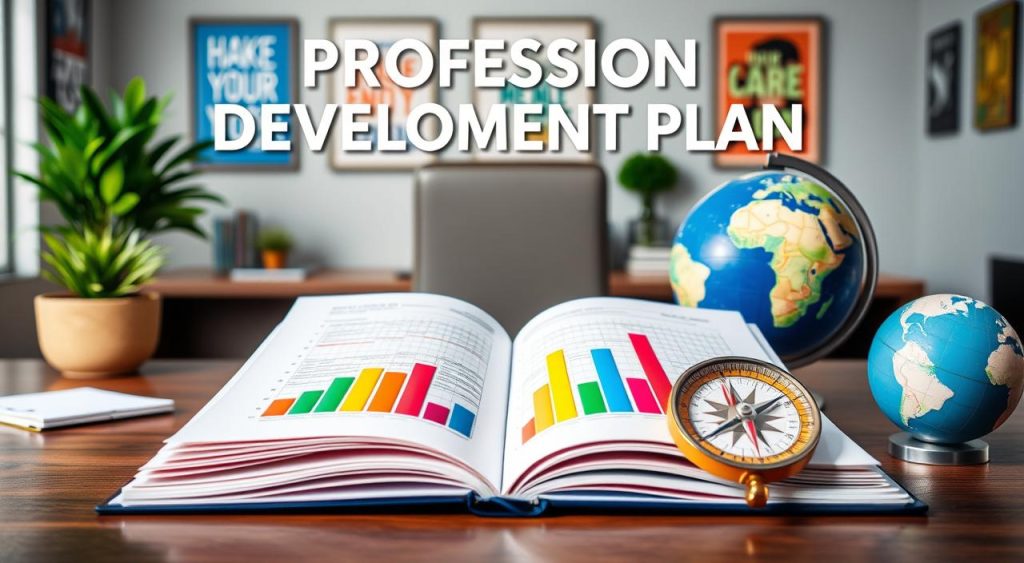A staggering 74% of employees feel they’re not reaching their full potential at work. This is because they lack development opportunities, recent reports show. Professional development is key in today’s corporate world. It’s vital for personal growth and for the success of the company.
Education and career growth go hand in hand. Modern businesses must recognize this. Employees need to focus on professional development. They do this by using educational resources to improve their skills and knowledge.
Staying in your job and growing can bring many benefits. It can lead to a more fulfilling job, promotions, and higher salaries. It also helps your career stay on track with industry changes. For companies, investing in employee growth boosts productivity and loyalty. This gives them an edge in the market.
This article will dive into the link between education and career paths. It will offer valuable insights on using professional development for career growth. Whether you aim for the top or want to grow in your current role, knowing how to grow is crucial. It’s the first step to a more rewarding and prosperous career.
The Importance of Continuing Education in Career Growth
In today’s job market, continuing education is key for growth. It can be through higher education, certifications, or degrees. These paths can greatly shape your career.
Fueling Ambition with Higher Education
Higher education widens your knowledge and fuels ambition. It introduces new ideas and critical thinking. This opens doors to high-level jobs that value advanced qualifications.
Online Learning Platforms and Their Impact on Professional Growth
Technology has brought online learning to the forefront. These platforms offer flexible learning. They help professionals improve their skills anytime, keeping them up-to-date in their fields.
Certifications vs Degrees: What’s Right for You?
Deciding between certifications and degrees is tough. Certifications are quicker and focus on specific skills. They’re great for immediate career use. Degrees offer a broader education and are better for long-term goals. Think about your career goals and what your industry needs to choose wisely.
Identifying Career Advancement Opportunities Within Your Organization
For those looking to move up in their careers, knowing how their company works is key. It’s not just about working hard. It’s also about knowing the job openings and matching your goals with the company’s plans.
First, learn about the areas where your company is growing. Look for where they’re expanding and what skills they need. This way, you can focus on learning what’s needed, making you ready for new job opportunities.
- Go to workshops and seminars to keep up with trends.
- Get to know department heads to learn about future plans.
- Share ideas for new projects that fit the company’s goals.
Being seen and networking in your company is as important as improving your skills. Take on new projects and show you’re ready for more. This will make you known to those who make decisions.
- Join teams that work on different things.
- Ask to be part of big projects.
- Talk to your boss about your career goals.
| Approach | Benefits |
|---|---|
| Enhancing Skills | Prepares for advanced roles, increases job security |
| Internal Networking | Builds relationships, enhances visibility within the company |
| Proactive Communication | Keeps career goals aligned with business objectives, opens up new opportunities |
In summary, moving up in your career needs smart planning, improving your skills, and networking inside. By doing these things, you’ll be ready to find and grab great job chances in your current company.
Education and Career: Aligning Professional Goals with Organizational Needs
As people aim to advance in their careers, it’s key to match their goals with their company’s plans. This connection boosts personal growth and helps the company succeed. By learning more and improving their skills, workers become key players in their teams.
The Role of Skills Assessments in Personal Development
Knowing your current skills is the first step to growing personally and professionally. Skills assessments reveal your strengths and what you need to work on. This helps you choose the right education and career path that fits your company’s goals.
Creating a Self-improvement Plan That Matches Company Direction
To link your career goals with your company’s aims, you need a smart self-improvement plan. This plan should focus on learning new skills and knowledge that your company needs. It helps you grow in your career and helps your company grow too.
Here’s how matching your goals with your company’s can lead to better career chances:
| Aligned Goals | Advantages | Impact on Career |
|---|---|---|
| Improving technological proficiency | Keeps pace with industry standards and innovations | Opens up opportunities for tech-driven roles |
| Enhancing leadership skills | Prepares for management positions | Facilitates career advancement to higher roles |
| Developing project management abilities | Improves efficiency and execution of company projects | Increases potential for leading major projects |
Leveraging Online Learning for Skill Development
In today’s fast-evolving job market, the need for constant skill improvement is huge. Online learning provides a flexible and wide platform for professionals looking to grow in their careers. This section will look at how to use e-learning to keep growing professionally.
Finding the Right Courses: A Guide to E-Learning
Choosing the right courses is key to getting the most out of online learning. With so many options, it can be hard to decide. Here are some tips to help you:
- Check if the courses match your current or future job needs.
- Look for courses that let you practice what you learn in real situations.
- Make sure the courses come from trusted sources or platforms.
- Read what others say about the courses to see if they’re worth it.
Maximizing the Benefits of Virtual Training for Career Progression
To get the most out of e-learning for career growth, plan your learning:
- Know what you want to achieve with your online courses.
- Plan when you’ll study to keep learning without upsetting your work-life balance.
- Get involved with the learning materials and online discussions to learn more.
- Use what you learn in your job to show your value to your employer.
By following these steps, you can improve your skills quickly and move your career forward.
Personal Branding and Visibility in the Workplace
Creating a strong personal branding strategy is key to getting noticed and finding career opportunities at work. It’s not just about how others see you. It’s about showing everyone your growth and what you bring to the table.
To show off your skills and wins, you need to share your special value clearly and often. Here are some smart ways to boost your personal branding:
- Develop a Professional Narrative: Tell a story about your career, focusing on your big wins and what you’ve learned.
- Active Networking: Connect with others in your field and beyond to grow your network and visibility.
- Consistent Online Presence: Keep your social media profiles professional and focused on your career goals.
- Seek Feedback: Ask for opinions on your work and branding efforts to improve and meet your goals.
- Contribute to Industry Discussions: Join in on talks and forums to share your knowledge and views.
By following these steps, you’ll not only enhance your personal branding. You’ll also be ready for new career opportunities and professional development. Taking charge of your career story lets you move forward with confidence and purpose.
Crafting a Professional Development Plan for Career Advancement
For career advancement, a detailed professional development plan is key. It outlines your career goals and the skills you need. It also shows how to get those skills and track your progress.
First, set clear, reachable goals in your career planning. These goals should match your personal dreams and your company’s strategy. Getting advice from a mentor or career advisor is very helpful.
- Determine where you want to be in your career over the next 3 to 5 years.
- Analyze the skills and knowledge required to reach these milestones.
- Select relevant training programs and workshops.
- Implement a timeline for achieving each milestone.
- Regularly review and adjust the plan as necessary.
After setting goals, find the right learning opportunities. This could be on-the-job training, formal education, or self-study. The right platforms are crucial for effective learning.
| Learning Opportunity | Skills Targeted | Expected Outcome |
|---|---|---|
| Online Courses | Technical Skills, Project Management | Increased expertise in specific areas |
| Workshops | Leadership, Communication | Enhanced interpersonal skills |
| Mentorship | Career Guidance, Networking | Broader professional network and better industry insights |
Tracking your progress in your professional development plan is key. This could be through regular reviews, skill assessments, or feedback from work.
In conclusion, a well-planned professional development plan is a smart way to career planning. It helps you grow both personally and professionally, leading to better career advancement.

Networking and Mentorship: Building Relationships for Growth
Networking and mentorship are key for career growth. Building relationships in your company opens new doors. It also gives you a support system for your professional growth.
The Power of Internal Networking: Tips and Strategies
Networking in your company can boost your visibility. It can lead to career advancement. It’s more than just connecting online; it’s about being active in company activities and projects.
- Attend company-sponsored events to meet new colleagues.
- Join groups or committees that align with your professional interests.
- Regularly share insights and resources with peers to establish thought leadership.
Seeking Out and Learning from Organizational Mentors
Getting advice from experienced mentors can change your career path. These mentors offer wisdom, advice, and insights into your industry and company.
Find mentors who share your values and career goals. Talk to them about what you want to learn and how you can help each other.
Job Opportunities: Seeking and Creating Growth Positions in Your Company
Finding and creating job opportunities in your company is key to professional development. It boosts your career and helps your company grow. This part talks about how to find and make unique growth spots inside.
Getting involved in current projects and teams is crucial for finding job opportunities. People who match their career planning with the company’s goals lead in creating new roles. It means being proactive in solving big challenges with new role ideas.
- Regularly review company goals and align them with personal professional aspirations.
- Engage with cross-departmental projects to broaden your understanding and impact within the company.
- Propose new roles or enhancements to existing positions that specifically aim to tackle pressing organizational challenges.
Having a strategic development plan is key to making these chances real. The plan should list the skills you need for growth and how to get them. This helps in professional development that matches your vision.
| Strategy | Purpose | Expected Outcome |
|---|---|---|
| Interdepartmental Collaboration | To understand broader company operations and needs | Ideation of new roles with cross-functional attributes |
| Professional Development Workshops | To acquire new skills and refine existing ones | Enhancing qualification for prospective new roles |
| Regular Performance Feedback | Gain insights into personal job performance and areas for improvement | Alignment of career goals with organizational objectives and feedback |
In conclusion, knowing about job opportunities in your company boosts your career and helps the company grow. This active approach in career planning is vital for anyone aiming for long-term career growth and professional development.
Vocational Training and Its Role in Professional Development
In today’s fast-changing work world, vocational training is key. It boosts technical skills and supports ongoing professional development. It helps businesses build a more skilled and flexible team.

Technical Skills Acquisition Through On-the-Job Training
On-the-job training is a hands-on way to learn. It lets people get real-world experience while doing their job. This method strengthens what they already know and introduces new skills and tech.
Collaborating with HR for Customized Vocational Programs
Working with the Human Resources (HR) team is crucial. They help create training programs that match employee growth with company goals. HR spots skill gaps and crafts training that meets both current and future needs.
Conclusion
Education and career growth go hand in hand, leading to success in any field. Learning for life opens up new chances and helps you contribute to your company’s goals. This article has shown how to use education to move forward in your career.
Using online learning, working on your personal brand, and building strong networks are key. They give you the tools you need to grow in your career. Adding vocational training and skills to your resume shows you’re serious about doing well in your field.
Creating a plan for your professional growth is crucial. It shows you’re committed to your future in the company. The link between learning and career success is clear. By improving your education and career fit, and using mentors and networks, you benefit both personally and professionally.



